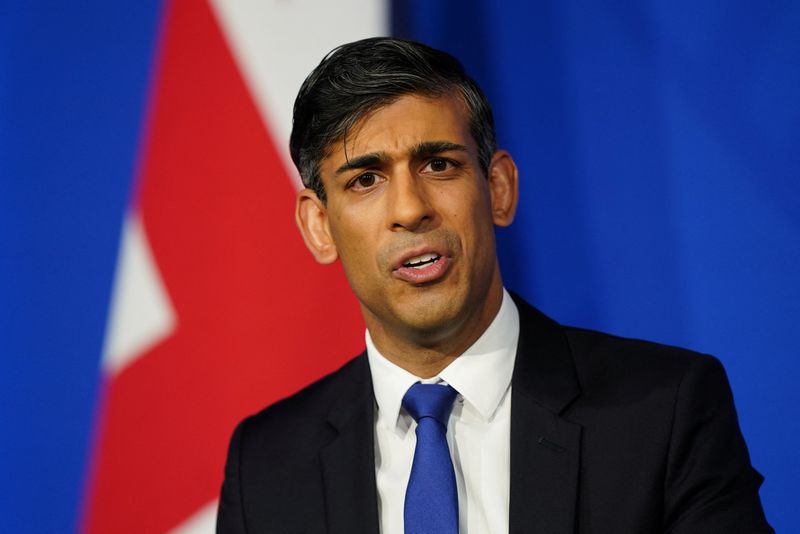By Andrew MacAskill
LONDON (Reuters) - Prime Minister Rishi Sunak faces the most dangerous moment of his premiership this week, when he is due to appear before a COVID-19 inquiry and must win a crunch vote in parliament on his plan to revive a policy to send asylum seekers to Rwanda.
Just over a year since he became prime minister, Sunak is struggling to maintain his authority, as politicians on both the left and the right of his Conservative Party are threatening to vote against his flagship asylum policy.
Parliament will hold a first vote on Tuesday on the legislation that would override some human rights law with the intention that this would allow the first deportation flights to leave for Rwanda before a national election expected next year.
The proposed law is opposed by some moderate Conservative politicians who are worried about Britain breaching its human rights obligations and also by right-wing lawmakers who want the government to go further. Both sides are taking legal advice before deciding how to vote.
For Sunak, struggling to revive a weak UK economy and heavily trailing the main opposition party in opinion polls, the Rwanda policy has become the defining issue for his government, despite lawyers saying at every stage that it will not work.
"The Rwanda policy has become a totemic struggle and it has liberated the factions in the Conservative Party to continue their all-out war," said Tony Travers, a politics professor at the London School of Economics.
The plan was ruled unlawful by the UK's Supreme Court last month, which said genuine refugees would be at risk of being returned to their home countries where they might face potential violence or ill treatment, which would breach British and international law.
The government has spent about a quarter of a billion pounds on the scheme in the hope it will deter the tens of thousands of people - including from Afghanistan, Iran and Iraq - who arrive on the south coast of England after crossing in small boats from France.
In a sign of how uncertain Sunak is about the size of any parliamentary rebellion, he decided against making it a confidence vote. If Sunak had done so and lost, he would have faced calls to hold a general election.
But the prime minister stands to be badly weakened if he loses any vote on the legislation. Only 29 Conservative members of parliament would need to rebel to defeat the government.
Asked on Sunday if Sunak would call a snap election if the legislation failed to pass, Michael Gove, a senior government minister in charge of regional development and housing, played down the possibility.
"No, we're not contemplating that because I'm confident that when people look at the legislation and have a chance to reflect, that they will recognise that this is a tough but also proportionate measure," he told Sky News.
DIVISIONS
Sunak finds himself in a similar crisis that engulfed the Conservative Party under former prime minister Theresa May during the 2016-19 fight to implement Brexit.
Once again a prime minister is facing a revolt from backbench members of parliament, there are rumours of colleagues plotting a leadership challenge, there are concerns about Britain abandoning its international promises, and questions about the power of parliament versus the judiciary.
Ahead of Tuesday's vote, Sunak will on Monday appear at the official COVID-19 inquiry for a day-long hearing examining his role in response to the pandemic.
Sunak, who was finance minister at the time, has been accused by one former government adviser of saying the government should "just let people die" rather than impose a lockdown because he was worried about the impact on the economy.
But the bigger danger for Sunak will come from the parliamentary battles over his Rwanda policy.
Some lawmakers said that while they expected the government to win the vote on Tuesday, a bigger showdown would come at the next stage when they can vote on amendments likely after Christmas.
"That's when the rebels will get stuck in," said one Sunak supporting Conservative member of parliament.
The Conservative Party chairman Richard Holden underlined the threat to the government last week when he warned colleagues it would be "insanity" to oust Sunak.
Britain was once known for its stable politics. But if Sunak were to be toppled, the country would be on its sixth prime minister in just over seven years for the first time since the 1830s.

Another Conservative politician said her colleagues needed to remember "politics is a team game".
"If we have another leadership contest we would be annihilated" at the next election, she said.